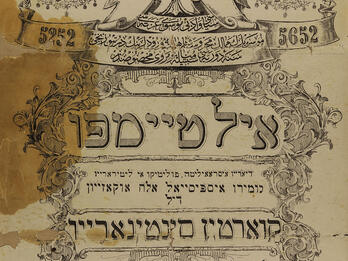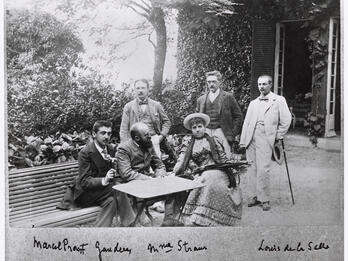Jewish Jokes, Parables, and Stories
Humor—is a Jewish thing. What Jew doesn’t enjoy listening to a nice story, parable, or witticism? When is a Jew indisposed to joking around? Not due to great luxury, God forbid, but on the contrary, due to hardships, poverty, humiliation, and constant worries about livelihood. Is there then a greater enjoyment than to stand on the street, or in the study hall, carrying on a conversation, and mocking the parnas,1 making fun of the wealthy benefactor, the tax farmer, and joking about the smallest to the greatest, making a complete mockery of them behind their backs? Tell a Jew what is really going on, and as long you make light of it, he’ll be happy. A magid,2 when he rises to speak in the synagogue, throws in, throughout his sermon, parables, stories, and digs, which the congregation greatly enjoy, melting in his hands, even though what he says hits them where it hurts. Jewish legend has created its jesters, professional wits, and jokesters, each known under a different name: Shmerl Schnitkever, Yosl Marshelik, Reb Hershele Ostropolyer, Reb Shloyme of Ludmir, and others.3 Who these were, what types of personalities, is difficult to say. Only the stories that are still told of them are frequently deep and sharp, and dipped in the dreadful poison of satire. It is to be understood that not everything that causes laughter is a joke, and not every joke is funny. There can be stupid jokes, woefully undersalted witticisms, parables without a peppery punch, and some stories too shameful to repeat in respectable company. (For example, the book about the Drazhner rebbe4 and other similar, “nice” books.) Consequently, among our people we can find preachers’ parables, jokes, and witticisms from intelligent human beings, which rightfully deserve to be gathered and published in a separate book. Accordingly, we have undertaken this and present here as examples several Jewish jokes, parables, and stories; and we turn with a request to all our readers individually: Whoever knows of a Jewish joke, parable, or story, should endeavor to record it in writing in any way possible, and please send it to us on time, so that it can be edited and printed in the Jewish Folk Library:5 only do not forget that we choose authentic Jewish jokes, parables, and stories, and not general stories, flat witticisms, or moldy jokes, which can be found today in every Jewish almanac.
Notes
[A community official.—Eds.]
[A preacher.—Eds.]
[Legendary Yiddish folk figures known for their biting wit.—Eds.]
[Likely a reference to Leyb Matlis’s Reb Yosef Loksh fun Drazhne in Poyln (1883). Yosef Loksh is later associated with the city of fools, Chelm, notably in Aaron Zeitlin’s The Wise Men of Chelm.—Eds.]
The names of those who will send us the aforementioned material will be, if they ask, printed in the Jewish Folk Library [Yudishes folks-bibliyotek] as participants in this project.
Credits
Published in: The Posen Library of Jewish Culture and Civilization, vol. 7.




